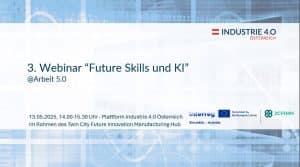
The third webinar in the “Future Skills & AI” series, organized by Plattform Industrie 4.0 under the Work 5.0 focus area and as part of the Interreg AT-SK project Twin City Future Innovation Manufacturing Hub, took place on May 13.
The first presentation, titled “Introducing AI in Companies: What Skills Are Needed?”, was delivered by Dr. Andreas Sackl from FH Technikum Wien.
He highlighted key success factors for implementing AI solutions and emphasized that focusing solely on technology is not enough. He illustrated this with a failed case of an automated inventory system in a retail company that lacked staff involvement, change management, and process adaptation. In contrast, a successful project by Lufthansa Cargo integrated early employee participation, feedback loops, and clear process alignment, resulting in long-term success. Key takeaway: beyond the tech, factors like data quality, legal frameworks, system integration, and most importantly, people are crucial. Acceptance doesn’t happen automatically—it must be actively cultivated.
Structured approaches like the Lean Canvas help define problems, target users, and solutions clearly. Only when the problem and the role of AI in solving it are well understood does implementation make sense. Change management is also essential: just 5% of employees are immediately open to new technologies. Overcoming scepticism requires early involvement, clear communication, and shared goal development. Successful AI projects are always also cultural and learning processes. The final message: AI success doesn’t start with code—it starts with a clearly defined problem. Considering technology, organization, and people as one ecosystem sets the foundation for sustainable outcomes.
FH Technikum Wien offers a broad range of study and training programs focused on AI, data analysis, and digital technologies. Its Computer Science Bachelor’s program, available in full-time and dual formats, tightly links academic learning with company experience. At the master’s level, part-time programs such as AI Engineering (technical AI applications) and Data Science (machine learning, statistics, analytics) are available. The Business Analytics Master’s further bridges theory and AI application in business contexts.
For professional development, the Technikum Wien Academy offers seminars, certificate courses, and in-house training. Highlights include the 3-day AI Essentials Seminar for beginners and the AI Bootcamp for participants with programming skills—both offering hands-on experience in machine learning and neural networks.
The second input, titled “Focusing on AI Competence: Strategy, Practice and Education within the Wiener Stadtwerke Group”, was presented by Larisa-Maria Stanescu from Wien IT GmbH.
Wiener Stadtwerke uses AI strategically to make urban services such as mobility (Wiener Linien, Wiener Lokalbahnen), energy (Wien Energie, Wiener Netze), IT, real estate, parking, and even cemeteries more efficient and sustainable. Rather than a short-term hype, AI is viewed as a long-term opportunity. This led to a company-wide AI strategy built on two pillars: an operational AI Competence Center and a Community of Experts representing all subsidiaries. Together, they defined core requirements—like increased efficiency, safe AI use, and access to expertise—and formulated a shared vision: AI should drive sustainable mobility and energy transitions and be embedded in core processes. The foundation: customer value, data security, ethics, and a strong commitment to digital humanism.
Founded in February 2025, the AI Competence Center leverages group-wide expertise to quickly develop and assess AI ideas through proof-of-concept projects. The goal is a low-barrier, iterative approach to AI development. Recognizing the vital role of change management, pilot projects like the rollout of Microsoft Copilot included training, Q&A sessions, and testing phases—leading to significantly increased adoption. A usage guide and mandatory e-learning course are being implemented to ensure responsible AI use. To build awareness and skills, prompting workshops teach hands-on AI use in a simple, practical way. The goal: reduce fear, spark innovation, and actively involve employees in digital transformation.
Many thanks to both speakers for their insightful and inspiring presentations!
